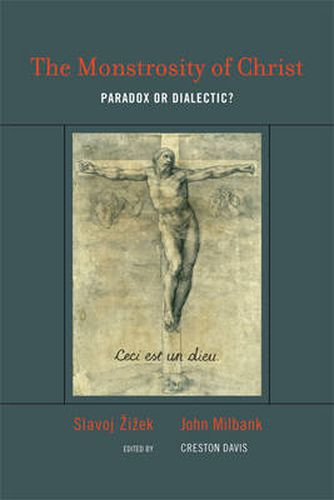Readings Newsletter
Become a Readings Member to make your shopping experience even easier.
Sign in or sign up for free!
You’re not far away from qualifying for FREE standard shipping within Australia
You’ve qualified for FREE standard shipping within Australia
The cart is loading…






What matters is not so much that A1/2iA3/4ek is endorsing a demythologized, disenchanted Christianity without transcendence, as that he is offering in the end (despite what he sometimes claims) a heterodox version of Christian belief. –John Milbank To put it even more bluntly, my claim is that it is Milbank who is effectively guilty of heterodoxy, ultimately of a regression to paganism: in my atheism, I am more Christian than Milbank. –Slavoj A1/2iA3/4ek In this corner, philosopher Slavoj A1/2iA3/4ek, who represents the critical-materialist stance against religion’s illusions; in the other corner, radical orthodox theologian John Milbank, an influential and provocative thinker who argues that theology is the only foundation upon which knowledge, politics, and ethics can stand. In The Monstrosity of Christ, A1/2iA3/4ek and Milbank go head to head for three rounds, employing an impressive arsenal of moves to advance their positions and press their respective advantages. By the closing bell, they have proven themselves worthy adversaries–and have also shown that faith and reason are not simply and intractably opposed. A1/2iA3/4ek has long been interested in the emancipatory potential offered by Christian theology. And Milbank, seeing global capitalism as the new century’s greatest ethical challenge, has pushed his own ontology in more political and materialist directions. Their debate in The Monstrosity of Christ concerns nothing less than the future of religion, secularity, and political hope in light of a monsterful event–God becoming human. For the first time since A1/2iA3/4ek’s turn toward theology, we have a true debate between an atheist and a theologian about the very meaning of theology, Christ, the Church, the Holy Ghost, universality, and the foundations of logic. The result goes far beyond the popularized atheist/theist point/counterpoint of recent books by Christopher Hitchens, Richard Dawkins, and others. A1/2iA3/4ek begins, and Milbank answers, countering dialectics with paradox. The debate centers on the nature of and relation between paradox and parallax, between analogy and dialectics, between transcendent glory and liberation. Short Circuits series, edited by Slavoj A1/2iA3/4ek
$9.00 standard shipping within Australia
FREE standard shipping within Australia for orders over $100.00
Express & International shipping calculated at checkout
Stock availability can be subject to change without notice. We recommend calling the shop or contacting our online team to check availability of low stock items. Please see our Shopping Online page for more details.
What matters is not so much that A1/2iA3/4ek is endorsing a demythologized, disenchanted Christianity without transcendence, as that he is offering in the end (despite what he sometimes claims) a heterodox version of Christian belief. –John Milbank To put it even more bluntly, my claim is that it is Milbank who is effectively guilty of heterodoxy, ultimately of a regression to paganism: in my atheism, I am more Christian than Milbank. –Slavoj A1/2iA3/4ek In this corner, philosopher Slavoj A1/2iA3/4ek, who represents the critical-materialist stance against religion’s illusions; in the other corner, radical orthodox theologian John Milbank, an influential and provocative thinker who argues that theology is the only foundation upon which knowledge, politics, and ethics can stand. In The Monstrosity of Christ, A1/2iA3/4ek and Milbank go head to head for three rounds, employing an impressive arsenal of moves to advance their positions and press their respective advantages. By the closing bell, they have proven themselves worthy adversaries–and have also shown that faith and reason are not simply and intractably opposed. A1/2iA3/4ek has long been interested in the emancipatory potential offered by Christian theology. And Milbank, seeing global capitalism as the new century’s greatest ethical challenge, has pushed his own ontology in more political and materialist directions. Their debate in The Monstrosity of Christ concerns nothing less than the future of religion, secularity, and political hope in light of a monsterful event–God becoming human. For the first time since A1/2iA3/4ek’s turn toward theology, we have a true debate between an atheist and a theologian about the very meaning of theology, Christ, the Church, the Holy Ghost, universality, and the foundations of logic. The result goes far beyond the popularized atheist/theist point/counterpoint of recent books by Christopher Hitchens, Richard Dawkins, and others. A1/2iA3/4ek begins, and Milbank answers, countering dialectics with paradox. The debate centers on the nature of and relation between paradox and parallax, between analogy and dialectics, between transcendent glory and liberation. Short Circuits series, edited by Slavoj A1/2iA3/4ek